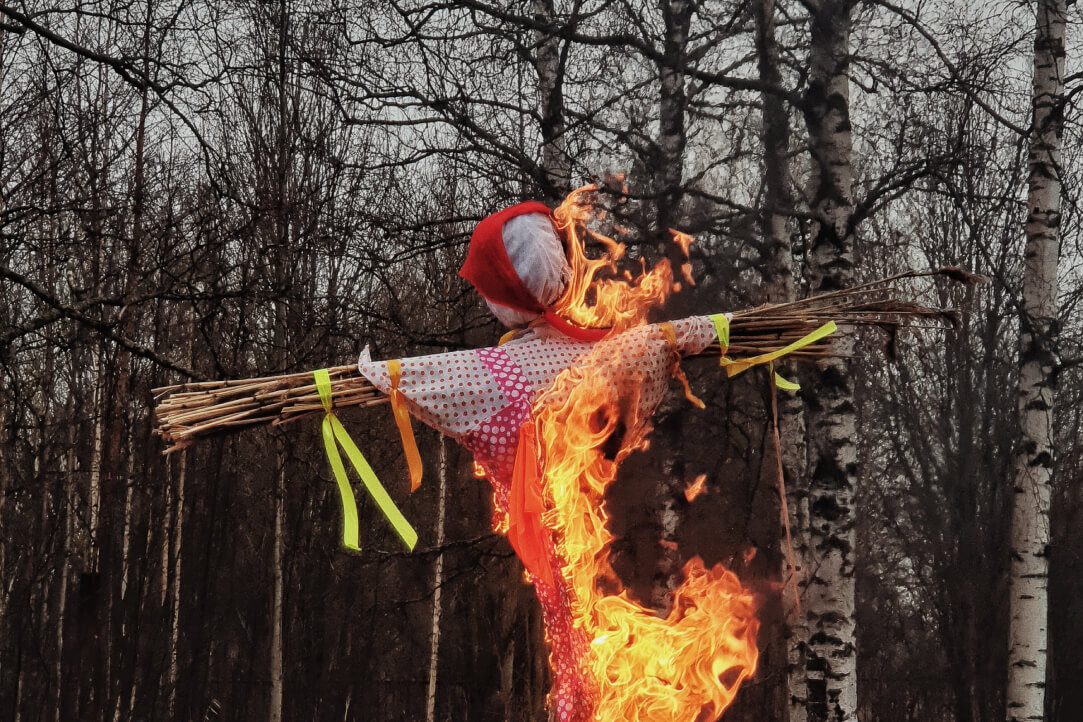Maslenitsa: Experiencing Pancake Week with HSE University-St Petersburg
On March 15, international students from more than ten countries visited an authentic Russian village to celebrate Maslenitsa. This week-long ancient holiday is impossible not to love: delicious pancakes with dozens of sweet and sour toppings, lots of games and activities, and the epic burning of the Maslenitsa doll will not leave anyone indifferent. Let’s recall that day!

After a long road to the village, the festive programme began with a lunch of staple Russian dishes, such as fish soup ‘ukha’ and beef Stroganov, the latter named after a member of the noble Stroganov family; his French chefs created this recipe specifically to his liking.
Right after, the group visited a traditional wooden house ‘izba’, where the guide told them about the meaning and traditions of Maslenitsa–a big occasion to say ‘farewell’ to winter and ‘hello’ to spring. In anticipation of the sowing season, ancestors hoped for a bountiful harvest and looked for omens in nature that could predict the reaping’s success. In big villages, young men and women would reveal their affections during the Maslenitsa week and were expected to get married soon thereafter. Kids and adults would go sledding off of icy hills, visit each other’s houses, sing, dance, and, of course, feast! After all, it’s the last week before the Great Lent–the longest fast of the year for Orthodox Christians–which is all about modesty and self-restraint.
The journey continued outdoors, where, under the careful guidance of villagers, the students tried their hand at spear-throwing and archery. The participants witnessed some natural-born talent that day! Team games included tug-of-war and required serious strength and coordination. Ultimately, everyone agreed upon a tie.
The ritual burning of the Maslenitsa doll after the games signified the end of winter. A long time ago, before calendars as we know them now, Maslenitsa celebrated the beginning of the new year. As the straw figure crackled and burned, everyone was encouraged to make a wish.
The international students finished off the evening with a holiday-themed tea party. There is no Maslenitsa without Russian pancakes–‘blini’. They can be paired with sour cream, condensed milk, redfish, caviar, and all sorts of jams. Everyone in Russia has their favourite topping! While filling the cups with tea, the group listened to traditional songs accompanied by live bayan–a sort of accordion developed in the Russian Empire in the early 20th century. The students were encouraged to participate: with authentic percussion instruments in their hands, they could accompany the singing in between taking bites of blini.
At the end of the evening, everyone boarded the bus home with a strong sense of community. Despite the drizzling rain outside the window that somewhat muddied the spring-welcoming mood that day, spirits were high. New connections made and new things experienced together, the students were a tired, but happy bunch.
Bekzod Karimov, Uzbekistan, exchange student

Maslenitsa was an incredibly fun and exciting celebration! We enjoyed delicious pancakes and played various games. Fun festivities and good company created a unique atmosphere of joy. It was a real celebration of soul and traditions. We competed in various contests, sang folk songs and danced to the sounds of live music. All together we created unforgettable memories filled with joy and peace.
Alejandra Vargas Vargas, Bolivia, 4th-year student of the Bachelor’s programme ‘International Business and Management’

I am truly grateful to the university for providing us with the invaluable opportunity to immerse ourselves in Russian culture through the Maslenitsa event. This immersive experience not only allowed us to deepen our understanding of Russian traditions but also provided a platform for cultural exchange and personal growth. By participating in Maslenitsa, we were able to build lasting connections with fellow participants, fostering a sense of camaraderie and community that extends beyond the event itself. This allowed us to not only broaden our cultural horizons but also enrich our lives with newfound friendships and memories to cherish for years to come.
Yassine Zniber El Mouhabbis, Morocco, exchange student

Experiencing Maslenitsa in Russia with HSE University-St Petersburg was unforgettable. Visiting a traditional village and participating in burning the doll ritual provided a unique insight into Russian culture. It was a memorable blend of tradition and community that left a lasting impression.
Joshua Fxentso Bishi, Nigeria, 1st-year student of the Master’s programme ‘International Business in the Asia-Pacific Region’

My experience of Maslenitsa in the calm village of Shuvalovka was nothing short of amazing. The village was adorned with traditional decorations, creating an atmosphere of fun, warmth, and hospitality for me. I played interesting games, made friends and was taught the traditional rites from Monday to Sunday of Maslenitsa. The villagers were dressed in vibrant traditional attire, and we were gathered to be entertained by singing from an elderly woman with a very beautiful voice and to be fed with a variety of food including the classic sweet blini. The atmosphere was filled with laughter, music, and joy. The highlight of the trip for me was the symbolic burning of the Maslenitsa doll, representing the end of winter and the arrival of spring. As I bid farewell to Shuvalovka and winter, I carried with me the memories of a festival that truly captures the essence of Russian culture.
Defne Şarlak, Turkey, 1st-year student of the Bachelor’s programme ‘Design’

The location where the event took place was a fascinating place in a wooded area, reminiscent of villages from old Slavic fairy tales. I learned a lot about Maslenitsa. I am very glad that I took part in such an event. This trip made me want to see, feel and live Russian culture more deeply and once again I was convinced of what a great culture Russia has.

